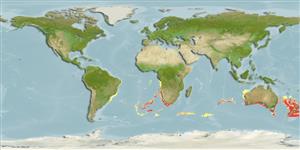Diastobranchus capensis Barnard, 1923
Basketwork eel
Add your observation in Fish Watcher
| Native range | All suitable habitat | Point map | Year 2050 |

|
| This map was computer-generated and has not yet been reviewed. |
| Diastobranchus capensis AquaMaps Data sources: GBIF OBIS |
Upload your photos and videos
Pictures | Google imageDiastobranchus capensis
Picture by Yau, B.
Pictures | Google imageDiastobranchus capensis
Picture by Yau, B.
New Zealand country information
Common names:
Basketwork eel
Occurrence: native
Salinity: marine
Abundance: scarce (very unlikely) | Ref: Doonan, I.J., M. Dunn and A.C. Hart, 2009
Importance: | Ref:
Aquaculture: | Ref:
Regulations: | Ref:
Uses: no uses
Comments: First record in the Chathams Island (Ref. 45493). Recorded as scarce in the Northeastern and Eastern Chatham Rise (Ref. 87166). Voucher specimen(s) held at the NMNZ. Also Ref. 3973.
National Checklist:
Country Information: https://www.cia.gov/library/publications/resources/the-world-factbook/geos/nz.html
National Fisheries Authority: http://www.fish.govt.nz/
Occurrences: Occurrences Point map
Main Ref: Paulin, C., A. Stewart, C. Roberts and P. McMillan, 1989
National Database:
Occurrence: native
Salinity: marine
Abundance: scarce (very unlikely) | Ref: Doonan, I.J., M. Dunn and A.C. Hart, 2009
Importance: | Ref:
Aquaculture: | Ref:
Regulations: | Ref:
Uses: no uses
Comments: First record in the Chathams Island (Ref. 45493). Recorded as scarce in the Northeastern and Eastern Chatham Rise (Ref. 87166). Voucher specimen(s) held at the NMNZ. Also Ref. 3973.
National Checklist:
Country Information: https://www.cia.gov/library/publications/resources/the-world-factbook/geos/nz.html
National Fisheries Authority: http://www.fish.govt.nz/
Occurrences: Occurrences Point map
Main Ref: Paulin, C., A. Stewart, C. Roberts and P. McMillan, 1989
National Database:
Common names from other countries
Classification / Names Common names | Synonyms | Catalog of Fishes(genus, species) | ITIS | CoL | WoRMS | Cloffa
Teleostei (teleosts) > Anguilliformes (Eels and morays) > Synaphobranchidae (Cutthroat eels) > Synaphobranchinae
Etymology: Diastobranchus: Greek, diastasis = separation + Greek, brangchia = gills (Ref. 45335).
More on author: Barnard.
Etymology: Diastobranchus: Greek, diastasis = separation + Greek, brangchia = gills (Ref. 45335).
More on author: Barnard.
Environment: milieu / climate zone / depth range / distribution range Ecology
Marine; bathydemersal; depth range 183 - 2000 m (Ref. 57911). Deep-water; 3°C - 4°C (Ref. 96237); 5°N - 50°S, 50°W - 179°E
Distribution Countries | FAO areas | Ecosystems | Occurrences | Point map | Introductions | Faunafri
Circum-austral, except eastern Pacific (Ref. 26895). Distributed on the continental slope of South Africa, off Tasmania, New Zealand, Discovery Seamount and the Rio Grande Rise off South America (Ref. 5167). Also found in Argentina (Ref. 47881). First record from the far north (Spitzbergen, Svalbard Arch.) (Ref. 96237).
Size / Weight / Age
Short description Identification keys | Morphology | Morphometrics
Life cycle and mating behavior Maturity | Reproduction | Spawning | Eggs | Fecundity | Larvae
Main reference
Upload your references | References | Coordinator | Collaborators
Gon, O., 1990. Synaphobranchidae. p. 102-104. In O. Gon and P.C. Heemstra (eds.) Fishes of the Southern Ocean. J.L.B. Smith Institute of Ichthyology, Grahamstown, South Africa. (Ref. 5167)
IUCN Red List Status (Ref. 130435: Version 2024-2)
Vulnerable (VU) (A2bd); Date assessed: 22 November 2019
Threat to humans
Harmless
Human uses
Fisheries: of no interest
FAO(Fisheries: production; publication : search) | FishSource | Sea Around Us
More information
Population dynamics
Growth parameters
Max. ages / sizes
Length-weight rel.
Length-length rel.
Length-frequencies
Mass conversion
Recruitment
Abundance
Growth parameters
Max. ages / sizes
Length-weight rel.
Length-length rel.
Length-frequencies
Mass conversion
Recruitment
Abundance
Life cycle
Reproduction
Maturity
Fecundity
Spawning
Spawning aggregations
Eggs
Egg development
Larvae
Larval dynamics
Reproduction
Maturity
Fecundity
Spawning
Spawning aggregations
Eggs
Egg development
Larvae
Larval dynamics
Anatomy
Gill area
Brain
Otolith
Gill area
Brain
Otolith
Physiology
Body composition
Nutrients
Oxygen consumption
Swimming type
Swimming speed
Visual pigments
Fish sound
Diseases & Parasites
Toxicity (LC50s)
Body composition
Nutrients
Oxygen consumption
Swimming type
Swimming speed
Visual pigments
Fish sound
Diseases & Parasites
Toxicity (LC50s)
Genetics
Genetics
Heterozygosity
Heritability
Genetics
Heterozygosity
Heritability
Human related
Aquaculture systems
Aquaculture profiles
Strains
Ciguatera cases
Stamps, coins, misc.
Aquaculture systems
Aquaculture profiles
Strains
Ciguatera cases
Stamps, coins, misc.
Tools
E-book | Field guide | Identification keys | Length-frequency wizard | Life-history tool | Point map | Classification Tree
| Catch-MSY |
Special reports
Download XML
Internet sources
Aquatic Commons | BHL | Cloffa | BOLDSystems | Websites from users | Check FishWatcher | CISTI | Catalog of Fishes(genus, species) | DiscoverLife | ECOTOX | Faunafri | Fishtrace | GenBank(genome, nucleotide) | GloBI | GOBASE | | Google Books | Google Scholar | Google | IGFA World Record | MitoFish | Otolith Atlas of Taiwan Fishes | PubMed | Reef Life Survey | Scirus | SeaLifeBase | Tree of Life | Wikipedia(Go, Search) | World Records Freshwater Fishing | Zoobank | Zoological Record
Estimates based on models
Preferred temperature (Ref. 115969): 4.2 - 9.6, mean 7 (based on 235 cells).
Phylogenetic diversity index (Ref. 82804): PD50 = 1.0000 [Uniqueness, from 0.5 = low to 2.0 = high].
Bayesian length-weight: a=0.00051 (0.00026 - 0.00101), b=3.13 (2.95 - 3.31), in cm Total Length, based on LWR estimates for this species & (Sub)family-body (Ref. 93245).
Trophic level (Ref. 69278): 4.5 ±0.55 se; based on food items.
Resilience (Ref. 120179): Low, minimum population doubling time 4.5 - 14 years (Assuming tmax>10).
Fishing Vulnerability (Ref. 59153): Very high vulnerability (90 of 100).
Climate Vulnerability (Ref. 125649): High to very high vulnerability (66 of 100).




